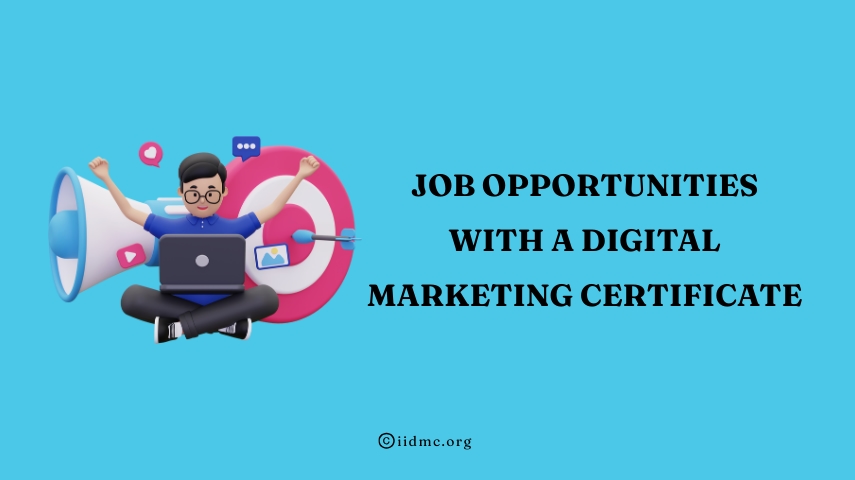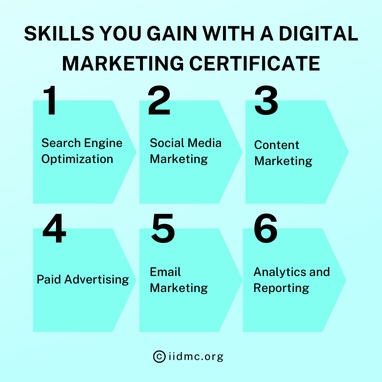
The internet has changed the way businesses operate. From shopping and education to entertainment and banking, everything is moving online. Because of this, companies need experts who can promote their products and services digitally. This is where digital marketing comes in.
A digital marketing certificate is a credential that proves you have the skills to help businesses succeed online. Unlike traditional degrees that may take 3–4 years, a certificate can be completed in a few months and still offer strong job opportunities.
It is cost-effective, saving time and money.
It is practical, focusing on real skills like SEO, social media, and paid ads.
It is flexible, suitable for students, working professionals, or entrepreneurs.
Why a Digital Marketing Certificate Matters
A digital marketing certificate is more than a credential; it is evidence of practical expertise. In today’s competitive job market, employers value demonstrated skills more than just academic qualifications.
Key Reasons a Certificate is Valuable
Practical Learning: Certificates emphasize hands-on training with tools and platforms widely used in the industry.
Faster Career Entry: While degrees may take years to complete, certificates are usually shorter, making them ideal for people who want to start working quickly.
Career Transition: Professionals from other fields, such as sales or IT, can use a certificate to switch into marketing.
Cost-Effective: Compared to traditional higher education, certificates are more affordable and often offer a better return on investment.
Industry Recognition: Many programs are recognized by leading companies, adding credibility to your resume.
Core Skills You Gain with a Digital Marketing Certificate
The main benefit of a certificate is the broad range of skills it provides. These skills make you employable across industries and prepare you for both jobs and freelance opportunities.
Skills Typically Covered

Search Engine Optimization (SEO): Techniques to help websites rank higher in search results.
Social Media Marketing: Building and managing campaigns across platforms like Instagram, Facebook, LinkedIn, and TikTok.
Content Marketing: Planning and producing blogs, videos, and graphics to attract and retain customers.
Paid Advertising: Running targeted campaigns on Google Ads, YouTube, and social media platforms.
Email Marketing: Crafting effective campaigns to build customer relationships and drive sales.
Analytics and Reporting: Using tools such as Google Analytics to measure performance and make data-driven decisions.
Job Opportunities After Earning a Digital Marketing Certificate
The best part about digital marketing is the variety of jobs available. You can start as a beginner and move up to leadership positions within a few years.
Entry-Level Roles:
Digital Marketing Assistant – Supporting senior marketers with campaigns.
SEO Analyst – Optimizing websites for better Google rankings.
Social Media Coordinator – Handling company social pages.
Junior Content Writer – Writing blogs, posts, and marketing content.
Mid-Level Roles (after some experience):
PPC Specialist – Running paid ads on Google and Facebook.
Content Marketing Manager – Leading blogs, social, and video strategies.
Email Marketing Specialist – Designing and executing email campaigns.
Digital Marketing Executive – Overseeing campaigns end-to-end.
Advanced Roles:
Digital Marketing Manager – Leading a marketing team.
Growth Marketing Lead – Designing strategies for rapid business growth.
E-commerce Marketing Manager – Handling digital sales strategies for online stores.
Head of Digital / CMO – Directing the entire digital strategy of an organization.
Freelancing and Entrepreneurial Opportunities
A digital marketing certificate also provides opportunities beyond traditional employment.
Freelancing: Many certified professionals work with international clients through platforms such as Upwork or Fiverr. They provide services in SEO, paid advertising, and content creation.
Agency Ownership: With experience, you can start your own digital marketing agency and serve multiple clients.
Consulting: Specialists often guide startups and small businesses on marketing strategies.
Personal Ventures: You can apply your skills to build your own blog, YouTube channel, or e-commerce store.
Freelancing and entrepreneurship provide flexibility in terms of working hours, income potential, and career control.
Industries Hiring Digital Marketing Professionals
Digital marketing is not confined to one sector. Every industry that has an online presence requires professionals with these skills.
Common Industries
Retail and E-commerce: Promoting online stores and increasing sales.
Technology and Software (SaaS): Marketing apps and software products.
Healthcare: Running awareness campaigns and promoting health services.
Education: Attracting students for schools, universities, and online learning platforms.
Real Estate: Generating leads for property developers and real estate agents.
Finance and Banking: Promoting financial products and services.
Hospitality and Tourism: Driving hotel bookings and travel packages through digital platforms.
This wide demand means digital marketing professionals can find opportunities in industries that align with their interests.
Salary Expectations and Career Growth
Earning potential in digital marketing is competitive and grows with experience and specialization.
Approximate Salary Ranges
Entry-Level (0–2 years): ₹2.5 LPA – ₹4.5 LPA
Roles: Digital Marketing Executive, SEO Analyst, Social Media Coordinator
Mid-Level (3–5 years): ₹5 LPA – ₹10 LPA
Roles: PPC Specialist, Content Marketing Manager, Digital Marketing Strategist
Senior Roles (6+ years): ₹12 LPA – ₹25 LPA+
Roles: Digital Marketing Manager, Growth Strategist, Head of Digital Marketing
Growth Path
Digital Marketing Assistant
Specialist or Executive
Manager
Head of Digital Marketing
Chief Marketing Officer (CMO) or Entrepreneur
Tips to Maximize Your Career with a Digital Marketing Certificate
A certificate alone is not enough; the way you apply your skills is what makes you stand out.
Practical Steps
Build a Portfolio: Showcase your work through projects, case studies, or internships.
Stay Updated: The industry changes quickly with new tools, trends, and algorithms. Keep learning continuously.
Network Actively: Join professional groups, attend webinars, and connect with industry experts.
Develop a Personal Brand: Share insights and your own work on LinkedIn or through a personal blog.
Specialize in One Area: For example, becoming an SEO expert or a paid ads specialist can help you stand out.
Best Institute for Digital Marketing Certificate
If you are planning to start a career in digital marketing or grow in your current job, choosing the right institute for certification is very important. A good digital marketing certification not only teaches you skills but also gives you recognition in the job market.
One of the best places to get certified is IIDMC – International Institute of Digital Marketing Certifications.
Why Choose IIDMC?
IIDMC is trusted by many learners worldwide because it focuses on practical, career-oriented learning. Here’s why IIDMC stands out:
International Recognition: IIDMC certifications are accepted globally, which means you can use them in India or abroad.
Updated Curriculum: The courses are designed with the latest tools, trends, and strategies in digital marketing.
Practical Learning: Training includes real-life projects, case studies, and hands-on assignments.
Flexible Learning: IIDMC offers both online and offline options, so you can learn at your own pace.
Career Support: IIDMC also provides guidance on internships, freelancing, and job opportunities.
Specialized Certifications: You can choose to specialize in SEO, Social Media, Content Marketing, or complete an advanced digital marketing program.
A digital marketing certificate opens the door to many career opportunities by giving you the right skills to work in areas like SEO, social media, content, and paid advertising. It not only helps you start a career in one of the fastest-growing industries but also allows you to explore freelancing, entrepreneurship, and global job roles. With increasing demand for digital skills across all sectors, a certificate is a smart step toward building a stable, flexible, and rewarding career in today’s digital world.
